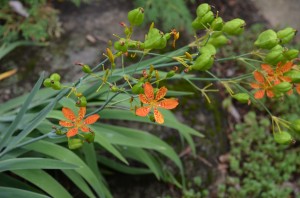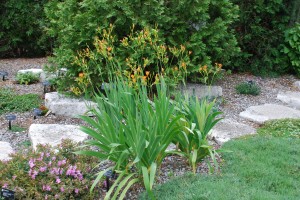Blackberry lily (Belamcanda chinensis), aka leopard lily, is native to Central Asia, China, Japan and India (USDA hardiness zones 5-9). It derives its name from clusters of shiny black seeds clearly in view as individual seed capsules split apart as they ripen. Its common name is misleading as it is not a lily, but instead a member of the Iris family (Iridaceae).
The sword-shaped leaves mimic those of gladiolus, also members of the Iris family. The medium green leaves measure up to 10 inches length. Plants grow 2 to 3 feet tall and bloom in mid to late summer (depending where you live). Flowers average 2 inches across, comprised of 6 orange colored petals splashed with red dots. Floral sprays stand on wiry, naked stems, typically 2-3 feet above the flat fan foliage. Heavy rains tend to topple floral stems which do not pick themselves back up.
Two species of blackberry lilies: 1. orange-colored flowers (B. chinensis) are most common; 2. unspotted yellow flowers of B. flabellata (‘Hello Yellow’). Latter species wants for more shade and water. Individual flowers last only a day. Decorative seed capsules are utilized in dried floral arrangements in fall.
Blackberry lilies thrive in average moist well-drained soils and light exposures from partial (4-5 hours) to full day sunlight. Plants may be started from seed or from rhizome divisions. In late summer or fall, before capsules fully open, collect seed and sow in a prepared bed about ½ inch deep. Seedlings emerge in late spring and usually bloom the first year. Blackberry lilies fail planted in poorly drained ground.
Clumps slowly expand via creeping rhizomes and usually not long-lived. They tend to seed-in readily, rarely becoming invasive.
Blackberry lily requires little maintenance. Few potential diseases and pests are troublesome. Iris borers may attack plant rhizomes. Some plant parts are poisonous, if ingested; keep away from young children or pets.



 Posted in
Posted in 
